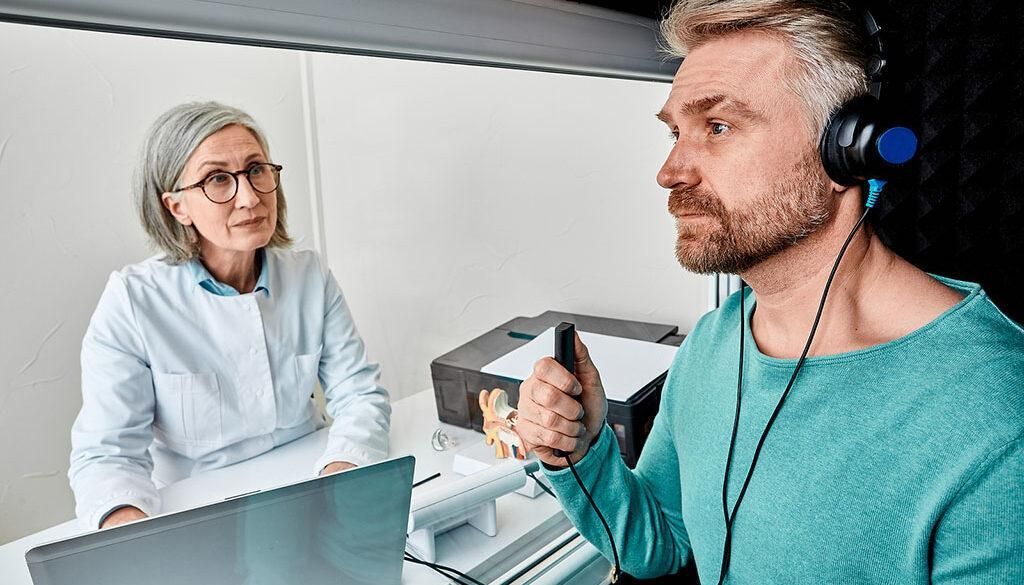Can Hearing Aids Help Reduce Dementia Risk?
It starts subtly. You’re in a crowded café, and you miss the punchline of a joke. You smile anyway, pretending you heard it. At dinner, you ask someone to repeat themselves for the third time. Even though you turn the TV volume as high as it goes, you notice it still sounds muffled, almost like you're wearing headphones. You tell yourself it’s nothing serious—just a bit of background noise, maybe some tired ears. But in the back of your mind, there’s a whisper: “What if it’s more?”
If you’re starting to notice these signs, you’re not alone. Hearing loss affects millions of people, especially as we get older. But what many people don’t realise is how closely hearing is tied to brain health. Researchers are now uncovering a powerful link between untreated hearing loss and dementia. The question is—can using hearing aids make a difference? The simple answer is yes. Let's examine how and why.
The Link Between Hearing and the Brain
Although your brain isn't responsible for hearing, it processes, remembers and understands all sounds the ear sends. But when the ear starts struggling with its duty and sends scrambled signals, it makes your brain work harder to interpret these sounds. Have you ever tried having a conversation at a party with the music blaring and, to top it off, the other person is whispering? That frustration you feel, yes, that's what your brain feels when you have untreated hearing loss.
Over time, this extra effort piles up (because your brain is running extra shifts it isn't built for). The longer this goes on, the harder it is to remember things and concentrate, which in turn affects your social connections.. You might find yourself withdrawing from conversations, avoiding social situations, and feeling more isolated. It’s not just a feeling—studies have shown that social isolation, often caused by hearing loss, is a major risk factor for dementia.
However, there’s another reason hearing matters so much: when the brain doesn’t get regular stimulation from sound, it begins to change. Areas that once processed sound start to shrink. Connections weaken. Memory suffers. This process is slow, but it’s real—and it’s one reason why hearing loss is now considered the number one modifiable risk factor for dementia.
So, Where Do Hearing Aids Come In?
If hearing loss increases your risk of dementia, then treating it might reduce that risk. That’s exactly what researchers have been looking into—and the findings are hopeful.
A major study published in 2023 found that people at risk of dementia who wore hearing aids had slower cognitive decline than those who didn’t. Other studies suggest that people who use hearing aids stay more socially engaged and mentally active, two important ways to protect the brain as we age.
When you wear hearing aids, you’re not just making sounds louder—you’re giving your brain the information it needs to stay sharp. Conversations become easier. You start picking up on little sounds again—the birds outside, the kettle boiling, the soft rustle of leaves. These sounds keep your brain active. They help you stay present.
And when you feel more confident hearing and engaging with others, you’re more likely to take part in life—to laugh, listen, share stories, and keep your mind busy. These small everyday moments are what protect memory and slow decline.
Early Action Makes the Biggest Difference
The key is not to wait.
Many people put off getting hearing aids, sometimes for years. Maybe it’s the stigma. Maybe it’s denial. But the longer hearing loss goes untreated, the harder it becomes for your brain to adjust. Those pathways that once processed sound grow quiet, and it takes more effort to wake them up again.
Getting help early means your brain doesn’t lose those connections. It means adapting more easily to hearing aids. And it means giving yourself the best chance to stay sharp, social, and independent.
You don’t need to wait until your hearing is “bad enough.” If you’ve noticed changes—struggling to follow conversations, avoiding noisy environments, feeling tired from listening—then it’s time to get a hearing test. It’s quick. It’s painless. And it could make more of a difference than you think.
You’re Not Alone—And You Don’t Have to Guess
At Ealing Hearing, we’ve seen how powerful hearing support can be. We’ve watched people go from withdrawn to engaged, from struggling to smiling. We take the time to understand your hearing, your lifestyle, and your goals. And if hearing aids are the right step for you, we’ll help you find a natural and empowering solution.
Dementia Action Week is a reminder that brain health matters at every stage of life. This year, the action you take could be as simple as booking a hearing check. Because sometimes, the first step to protecting your memory isn’t a crossword or a brain-training app—it’s listening.
Listening to the sounds around you. Listening to your loved ones. Listening to your own needs.
Book Your Hearing Test Today
If you’re ready to take control of your hearing health—and support your brain along the way—we’re here to help. Contact us at Ealing Hearing to book your hearing test or speak with one of our audiologists.
Better hearing isn’t just about sound; it’s about staying connected to others, to life, and to yourself.



